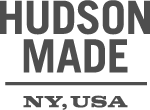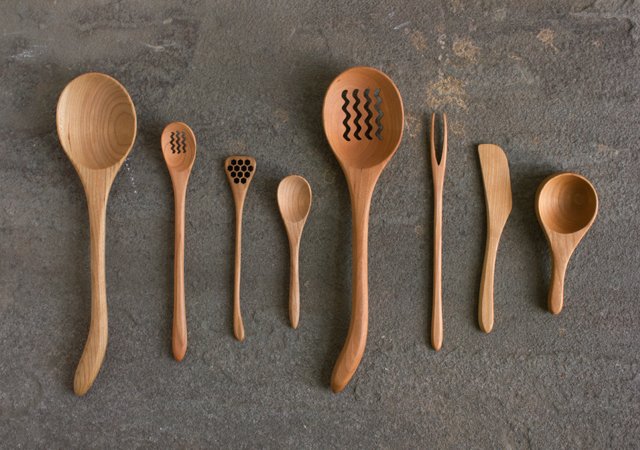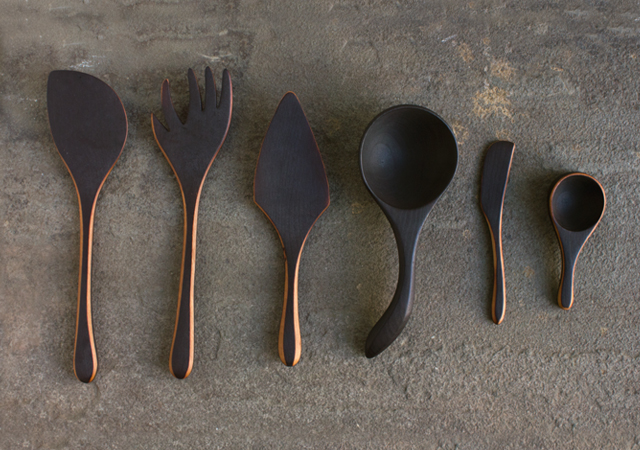For Jonathan Simmons of Jonathan’s Spoons, running a cottage industry that creates and sells handcrafted, natural wood products is more than business. It’s an extension of his personal philosophy, which prizes independence and fair trade over all.
“It means I am free to do what I want,” said Simmons, 58, “but it’s more than that. It’s being free to take my ideas and make them into something. My mission is to take at least some of the ideas and bring them into the physical world. Ideas are spiritual things. They rain down upon us and it’s up to us to do something with them.”
If the emphasis on spirituality in a capitalist context seems odd, Simmons is comfortable with the incongruity; his father was a pastor in the Swedenborg Church who would remind his children that life is best enjoyed when utilizing the bounty of nature in a meaningful way while acknowledging the greater power that provides it.
Jonathan Simmons – Photo credit: Arts Business Institute.
“It’s very satisfying to have things out of my imagination be created in the physical world,” Simmons added.
The pastor’s son was serving as an apprentice to a furniture maker in the mid-70s when he created his first wooden spoon, a matter of necessity because he had forgotten to pack a spoon in his bag lunch that day.
It would be a few years later, while casting about for ideas for his own business in Maine that Simmons flashed back on that simple moment of invention. By 1979, Jonathan’s Spoons was a bona fide business based in Kempton, Pennsylvania, where native hardwood is plentiful.
“At my first national craft show,” Simmons recalls on his website, “I underpriced my spoons and sold out my years’ production in the first hour of the show.”
Originally, Simmons crafted his spoons from lilac, plum, and honeysuckle woods. However, he found cherry wood to be best suited for its durability, color and grain. Soon, his spoon product line had grown to include spatulas, tongs, spaghetti forks and spreaders, rendered in the Arts and Crafts style. He even features spoons for left-handed chefs.
However, it was several years before Simmons and wife Julia agreed to expand their modest operation and hired a friend as the first employee. “I had to accept the role of owner and take ownership of my own business.”
Working conditions at Jonathan’s Spoons reflect the sensibility of the founder.
“People work better with more freedom,” Simmons said. “I want the people who are doing the work of making the spoons to enjoy it. I have no intention to use slave labor, as it seems most companies are doing. Freedom is just very important to me. My employees are free to come and go, as they want; we have a very open schedule.”
Moreover, employees are free to earn more or less according to their efforts based on a piece rate system. “I treat them as if they are operating their own mini business within mine.”
Of course, all hands must be on deck in the early fall to fulfill Christmas orders. Directly after the holidays, the workshop is again at full tilt, creating inventory for the wholesale season and trade shows.
Seven years ago, Jonathan’s Spoons faced its first full-on crisis: a former employee launched a line of knock-off spoons. While Simmons initially tried to stop the competitor, he decided to withdraw from the battle. Good fortune, he said, unexpectedly intervened; kitchen guru Rachael Ray gushed over Jonathan’s “Original Lazy Spoon” on a televised segment and sales doubled overnight.
“It was a karmic thing to let go of a fight,” Simmons said, “and wonder what was going to happen in a tough economy and then have it turn around so amazingly. It was a lasting effect; it was beyond a flash in the pan.”
Additional products join the line thanks to equal parts instinct and whim, not due to extensive focus group research. Simmons has created wooden boxes. One of his five children suggested hand tooled stands for iPhones and iPads. Simmons is currently weighing the feasibility of a line of furniture, crafted for assembly without glue. His latest brainchild is a pen spoon “that you can write with – and eat your yogurt. Not sure whether it will fly but it’s something I have always wanted.”
Prone to understatement in his work, Simmons doesn’t emphasize that he only uses wood harvested through sustainable practices.
“We utilize as much of the wood as we can. But I don’t talk about it a whole lot with [customers]. I haven’t hyped that. I don’t feel I’m very good at hyping stuff. I’m just trying to make an honest product.”
Feeling inspired to get in the kitchen yourself? Check out our exclusive collections from Hudson Made, featuring one-of-a-kind items paired with some of our most popular kitchen products:
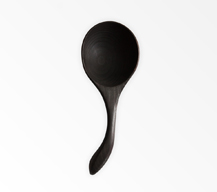 |
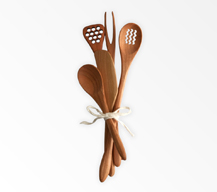 |
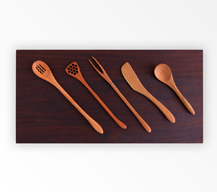 |
| Flame-Blackened Wide Ladel | Jonathan’s Spoons Set | The Deluxe Kitchen Set |
Jay Blotcher, a longtime writer for magazines, relocated from New York City to the Hudson Valley in 2001. He is currently at work on Holding On, a new musical about Harlem life in the 1960s with composer Neil Klein. www.holdingonthemusical.com
